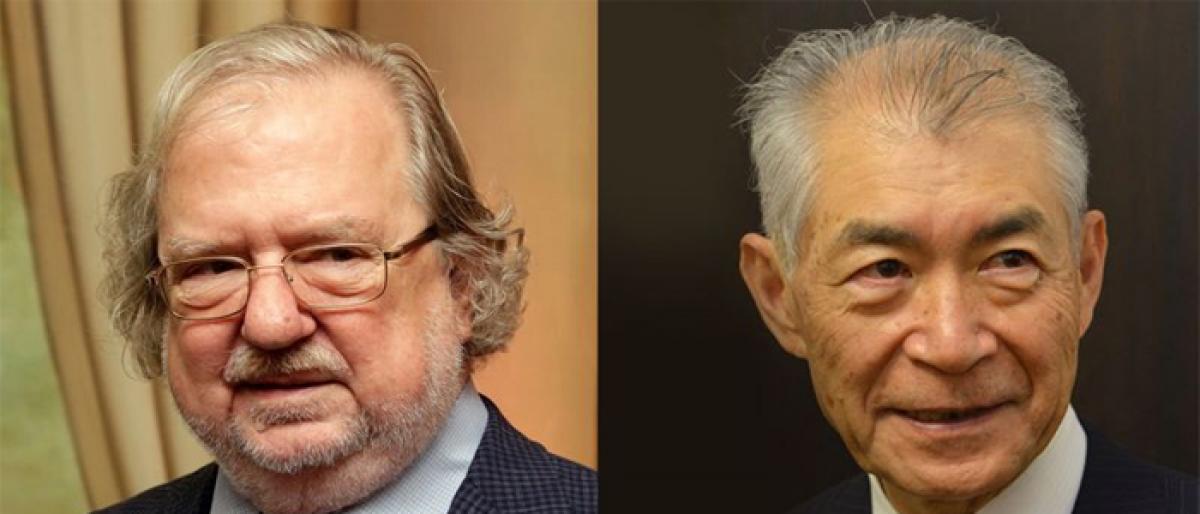Live
- Kisan Diwas 2024: A Day Dedicated to honor our Farmers.
- Axed ACP takes the wind out of Pushpa hero’s sails
- Tender apology to CM, mantri tells Allu Arjun
- CM condemns attack on Allu Arjun’s house
- Allu Arjun’s house attacked, police arrest 6 persons in city
- APSRTC to replace diesel buses with electric buses
- Komatireddy brothers should get Oscar for lying: BRS
- KTR asks farmers to up the ante against TG govt
- SCB residents raise pitch for fair compensation for acquired lands
- TGMC crackdown on quackery continues, over 400 FIRs filed
Just In

James Allison of the US and Tasuku Honjo of Japan have jointly won the Nobel Prize in Medicine on Monday for developing a pioneering therapeutic approach for cancer treatment The pair revolutionised cancer treatment, showing how our immune system can be effectively engaged in the fight against tumour cells
Stockholm: James Allison of the US and Tasuku Honjo of Japan have jointly won the Nobel Prize in Medicine on Monday for developing a pioneering therapeutic approach for cancer treatment. The pair "revolutionised cancer treatment," showing how our immune system can be effectively engaged in the fight against tumour cells.
The treatment that the researchers helped develop, often referred to as "immune checkpoint therapy", has fundamentally changed the outcome for certain groups of patients with advanced cancer. "By stimulating the inherent ability of our immune system to attack tumour cells this year's Nobel Laureates have established an entirely new principle for cancer therapy," the Nobel Assembly at Karolinska Institutet here said in a statement.
Allison, Professor at the University of Texas MD Anderson Cancer Center in US, studied a known protein, CTLA-4, that functions as a brake on the immune system. He realised the potential of releasing the brake and thereby unleashing our immune cells to attack tumours. He then developed this concept into a brand new approach for treating patients.
In parallel, Honjo, Professor at Kyoto University in Japan, discovered a protein on immune cells and, after careful exploration of its function, eventually revealed that it also operates as a brake, but with a different mechanism of action.
Therapies based on his discovery proved to be strikingly effective in the fight against cancer, the Nobel Assembly at Karolinska Institutet, which awards the Nobel Prize in Medicine, said.
Honjo's research showed that the protein PD-1, similar to CTLA-4, functions as a T-cell brake. The fundamental property of our immune system is the ability to discriminate "self" from "non-self" so that invading bacteria, viruses and other dangers can be attacked and eliminated. T cells, a type of white blood cell, are key players in this defence.
Allison and Honjo showed how different strategies for inhibiting the brakes on the immune system can be used in the treatment of cancer.
"The seminal discoveries by the two Laureates constitute a landmark in our fight against cancer," the statement added. After the initial studies showing the effects of CTLA-4 and PD-1 blockade, the clinical development has been dramatic.
Of the two treatment strategies, checkpoint therapy against PD-1 has proven more effective and positive results are being observed in several types of cancer, including lung cancer, renal cancer, lymphoma and melanoma. New clinical studies indicate that combination therapy, targeting both CTLA-4 and PD-1, can be even more effective, as demonstrated in patients with melanoma, a type of skin cancer.
Thus, Allison and Honjo have inspired efforts to combine different strategies to release the brakes on the immune system with the aim of eliminating tumour cells even more efficiently.

© 2024 Hyderabad Media House Limited/The Hans India. All rights reserved. Powered by hocalwire.com







